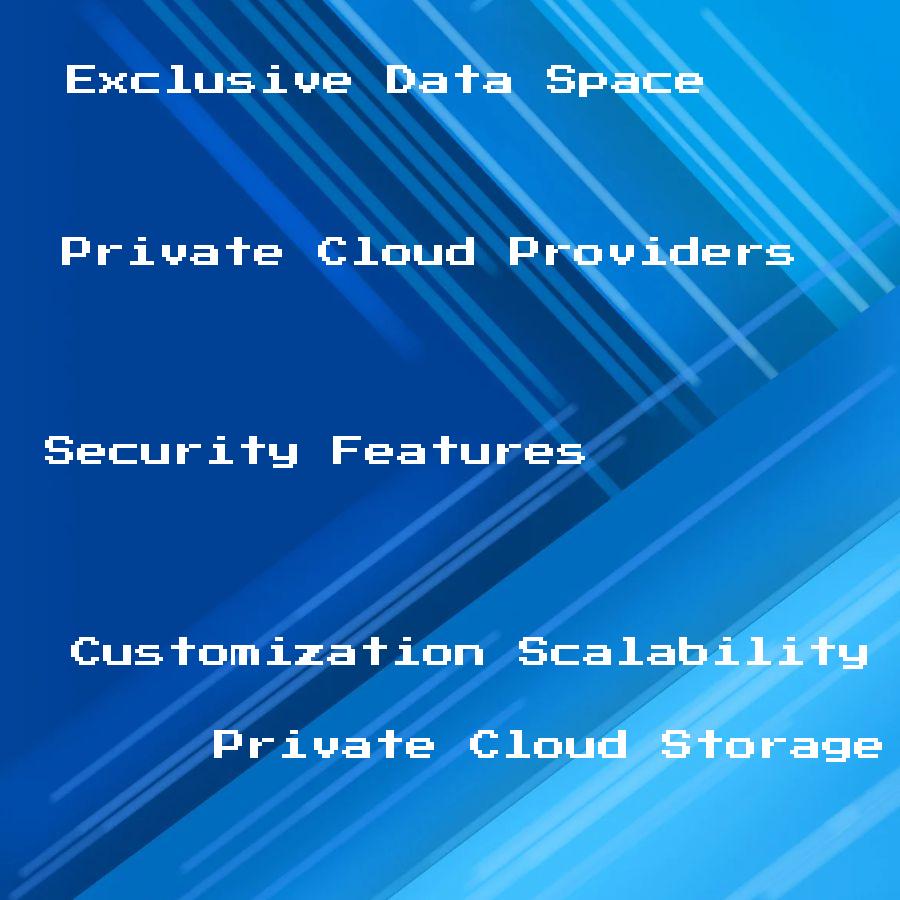Discover the benefits of private cloud storage solutions, offering you an exclusive space to securely store and manage your data with ease.
In today’s digital age, data is the backbone of any business. Whether it’s customer information, financial records or project data, storing and managing it efficiently is crucial.
With the rise of cloud computing, businesses can now store their data on remote servers and access it from anywhere in the world. However, not all companies are comfortable with storing their sensitive information on public clouds due to security concerns.
This is where private cloud storage solutions come in – offering exclusive space for your data that only you can access and control. In this blog post, we’ll explore what private cloud storage solutions are and how they can benefit your business.
Private Cloud Storage: An Overview

Private cloud storage is a type of cloud computing that offers exclusive space for storing and managing data. Unlike public clouds, private clouds are dedicated to a single organization or user group, providing greater control over the infrastructure and security measures.
Private cloud storage solutions can be hosted on-premises or by third-party providers, offering businesses flexibility in terms of customization and scalability.
One significant advantage of private cloud storage is its ability to provide an isolated environment for sensitive data. This means that only authorized personnel have access to the information stored within it, reducing the risk of unauthorized access or cyber-attacks.
Moreover, private clouds offer more customization options than public ones since they are designed specifically for one organization’s needs. Companies can tailor their infrastructure according to their specific requirements without worrying about sharing resources with other users as in public clouds.
Benefits of Exclusive Data Space
One of the most significant advantages is enhanced security and privacy. With private cloud storage, your data is stored on dedicated servers that are not shared with other users, reducing the risk of unauthorized access or cyber-attacks.
Another benefit is customization and scalability. Private clouds can be tailored to meet specific business needs, allowing for greater flexibility in terms of storage capacity and performance requirements.
This means you can easily scale up or down as needed without having to worry about running out of space.
Private cloud providers often offer advanced features such as automated backups and disaster recovery options which ensure your data remains safe even in case of unexpected events like natural disasters or system failures.
Top Private Cloud Providers
Each provider offers unique features and benefits that cater to different business needs. Here are some of the top private cloud providers:
1. Amazon Web Services (AWS): AWS provides a range of services for businesses looking for secure and scalable private cloud storage solutions.
2. Microsoft Azure: With its hybrid capabilities, Microsoft Azure allows businesses to store their data on-premises or in the cloud with ease.
3. Google Cloud Platform: Google’s robust infrastructure ensures high availability and reliability for your data while providing advanced security features.
4. IBM Cloud Private: IBM’s offering is designed specifically for enterprise-level organizations that require complete control over their data management processes.
5- Rackspace Private Cloud: Rackspace offers fully managed private clouds with 24/7 support, making it an ideal choice for small-to-medium-sized businesses without dedicated IT teams.
Choosing a provider depends on various factors such as budget, scalability requirements, customization options needed by your organization among others.
Security Features in Private Storage
Private cloud storage solutions offer several advanced security features that ensure your data remains safe from unauthorized access and cyber threats. These include end-to-end encryption, multi-factor authentication, firewalls, intrusion detection systems (IDS), and regular backups.
End-to-end encryption ensures that your data is encrypted at all times – both when it’s in transit and when it’s at rest on the server. This means that even if someone intercepts your data during transmission or gains access to the server where it’s stored, they won’t be able to read or decipher its contents without the decryption key.
Multi-factor authentication adds an extra layer of protection by requiring users to provide two or more forms of identification before accessing their private cloud storage account. This could include something you know (like a password), something you have (like a smart card) or something you are (like biometric information).
Firewalls prevent unauthorized access by monitoring incoming and outgoing network traffic based on predefined rulesets. Intrusion detection systems monitor for suspicious activity within the network environment so any potential threat can be detected early enough before causing damage.
Regular backups ensure that even if there is an unexpected system failure or disaster like ransomware attack occurs; businesses can quickly recover their lost files with minimal downtime.
Customization and Scalability
Unlike public clouds, where you have to use pre-configured settings, private clouds can be tailored to meet your specific needs. You can choose the hardware specifications, operating system, and software applications that best suit your business requirements.
Moreover, scalability is another significant benefit offered by private cloud storage solutions. As businesses grow over time or experience seasonal fluctuations in demand for their services or products; they need more space to store data securely without compromising performance levels.
Private cloud providers allow you to scale up or down as per your changing needs quickly. This means you don’t have to worry about running out of space when there’s an influx in traffic on your website during peak seasons like Black Friday sales events.
Customization and scalability are two critical factors that make private cloud storage solutions stand out from other options available in the market today.
Cost Analysis: Is It Worth It?
Private clouds are generally more expensive than public clouds due to their exclusive nature and additional security features. However, the benefits that come with private cloud storage can outweigh the costs in many cases.
For instance, if your business deals with sensitive data such as financial records or customer information, investing in a private cloud solution can provide peace of mind knowing that your data is secure and only accessible by authorized personnel. Some industries have strict compliance regulations regarding data privacy which may require companies to use a private cloud solution.
Another factor to consider when analyzing costs is customization and scalability options offered by different providers. Private clouds offer greater flexibility compared to public ones since they allow you to customize resources according to your specific needs without sharing them with other users on the same server.
Data Privacy and Compliance
With the increasing number of data breaches, companies need to ensure that their sensitive information is secure from unauthorized access. Private cloud storage solutions offer enhanced security features such as encryption, firewalls, and intrusion detection systems to protect your data from cyber threats.
Moreover, private cloud providers comply with various regulations such as HIPAA (Health Insurance Portability and Accountability Act), GDPR (General Data Protection Regulation), or CCPA (California Consumer Privacy Act). These regulations require companies to implement strict measures for protecting personal information.
By choosing a private cloud storage solution that complies with these regulations, you can rest assured that your business is meeting its legal obligations while keeping customer data safe. In addition to this peace of mind regarding regulatory compliance requirements being met by the provider’s infrastructure design choices; it also allows you more control over how your company handles sensitive information internally – which can be especially important if there are specific industry standards or best practices in place within certain sectors where confidentiality must be maintained at all times.




